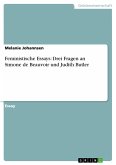This book contextualises philosophy by bringing Judith Butler's critique of identity into dialogue with an analysis of the transgressive self in dramatic literature. The author draws on Butler's reflections on human agency and subjectivity to offer a fresh perspective for understanding the political and ethical stakes of identity as formed within a complex web of relations with human and non-human others. The book first positions a detailed analysis of Butler's theory of subject formation within a broader framework of feminist philosophy and then incorporates examples and case studies from dramatic literature to argue that the subject is formed in relation to external forces, yet within its formation lies a space for transgressing the same environments and relations that condition the subject's existence. By virtue of a fundamental dependency on conditions and relations that bring human beings into existence, they emerge as political and ethical agents capable of resisting the formative forces of power and responding - ethically - to the call of others.
"Readers will find a welcome addition to Butlerian philosophy ... . Shams delineates a way for scholars interested in feminist philosophy, theatre, or literary studies to situate their own thinking about theories of subjectivity and apply them to literary or dramatic texts. ... Judith Butler and Subjectivity successfully contemplates the conditions that influence the subject's emergence. The study presents a thoughtful approach to Butler's work and exhibits a thorough understanding ... ." (Sharen Bart, Limina, Vol. 27 (1), 2021)








